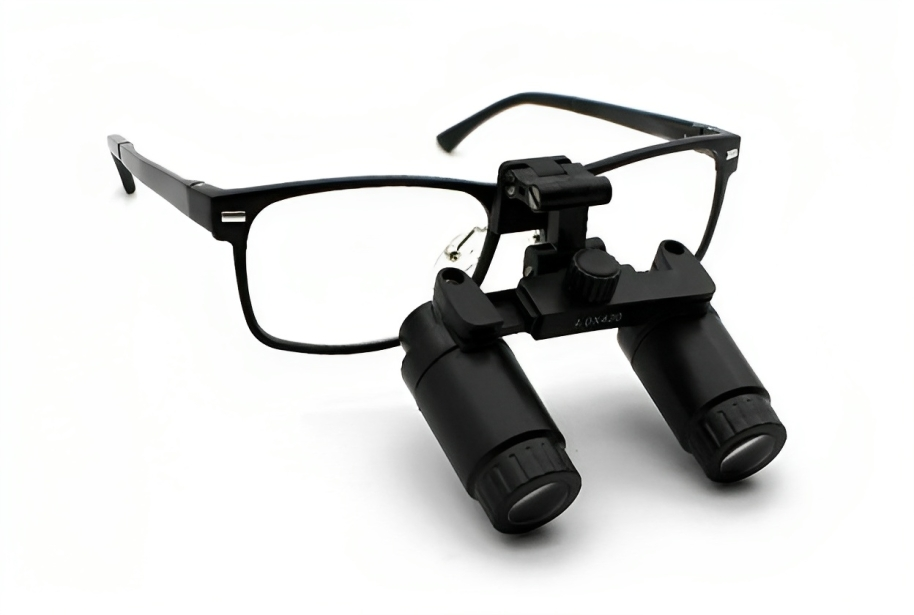What are Dental Loupes Used For?
- 1 What are Dental Loupes?
- 2 What are Dental Loupes Used For?
- 2.1 Enhanced Visual Detail:
- 2.2 Precision in Dental Procedures:
- 2.3 Ergonomic Benefits:
- 2.4 Educational Tool:
- 2.5 Enhancing Patient Confidence and Communication:
- 2.6 Adaptability to Various Dental Fields:
- 3 Types of Dental Loupes
- 4 Magnification and Optics
- 5 Wrapping Up
In dentistry, precision is key. The best dental loupes, which resemble high-tech magnifying glasses, have become a cornerstone for this precision. These tools are not just about magnification; they’re about enhancing the dentist’s vision to unprecedented levels. This introduction to dental loupes will shed light on their definition, types, and the crucial role they play in modern dental practice.
What are Dental Loupes?
At their core, dental loupes are specialized optical magnifiers. They’re designed to be worn similarly to eyeglasses, providing an enlarged view of the mouth and teeth. This magnification allows dentists to see fine details that would be invisible to the naked eye. Loupes come in various types, including ‘Through the Lens’ (TTL) and ‘Flip-up’ models, each offering distinct advantages and catering to different preferences.
What are Dental Loupes Used For?

Dentist loupes are an essential tool in dentistry, offering a range of benefits that significantly enhance the quality of care provided to patients. Here are the critical uses and applications of dental loupes:
Enhanced Visual Detail:
- Magnification: Dental loupes provide varying magnification levels, usually 2.5x to 6x. This magnification is crucial for seeing fine details in the oral cavity that are not visible to the naked eye. It enables dentists to detect small cavities, hairline fractures, and other minute anomalies that could otherwise go unnoticed.
- Improved Diagnosis: Dentists can make more accurate diagnoses with enhanced visual detail. They can identify the early stages of dental issues, such as gum disease or tooth decay, leading to more effective and less invasive treatments.
Precision in Dental Procedures:
- Surgical Accuracy: Precision is paramount during dental surgeries. Dental loupes allow for a more detailed view of the surgical area, enabling dentists to perform intricate procedures with greater accuracy and confidence.
- Quality of Treatment: Procedures like root canal treatments, restorative dentistry, and periodontal surgeries benefit significantly from the magnified view provided by loupes, leading to higher-quality outcomes and improved patient satisfaction.
Ergonomic Benefits:
- Reduced Physical Strain: Dental professionals often spend long hours in procedures that require intense focus. Dental loupes help maintain a more ergonomic posture, reducing neck and back strain from prolonged bending and leaning.
- Eye Comfort: Extended periods of intense concentration can lead to eye strain. Loupes reduce this strain by providing a larger field of view and reducing the need for constant refocusing.
Educational Tool:
- Training and Skill Development: Dental loupes are invaluable in educational settings, allowing students to observe procedures in great detail. They facilitate a deeper understanding of dental anatomy and procedure techniques.
- Mentorship and Demonstration: Experienced dentists use loupes to demonstrate techniques to trainees, making them an essential tool for hands-on learning and mentorship in dental education.
Enhancing Patient Confidence and Communication:
- Building Trust: Advanced tools like dental loupes often instil confidence in patients. They appreciate the commitment to precision and care, which helps build trust.
- Educational Interaction: Dentists can use loupes better to explain specific dental conditions and treatments to patients, making them more informed and involved in their dental care.
Adaptability to Various Dental Fields:
- Wide Application: Dental loupes are not limited to general dentistry. They are extensively used in orthodontics, endodontics, periodontics, and other specialized areas of dentistry.
- Customization Options: Dental loupes can be customized to suit the specific needs of different dental practices, with options like through-the-lens (TTL) and flip-up models and various magnification levels.
Dental loupes signifies a commitment to precision, patient well-being, and continual advancement in dental practices.
Types of Dental Loupes
Through the Lens (TTL) Loupes
TTL loupes are custom-made for each dentist, offering a personalized fit. They are directly mounted onto the glasses and provide a steady, high-quality visual field.
Flip-Up Loupes
Flip-up loupes offer flexibility. They can be adjusted or moved out of the line of sight, making them a versatile choice for different dental procedures.
Magnification and Optics
Levels of Magnification
Dental loupes come in various magnification levels, typically 2.5x to 6x. The choice of magnification depends on the dentist’s needs and the procedure being performed.
Optical Quality
The optical quality of loupes is critical. High-quality lenses reduce distortion and provide a clearer image, which is essential for precision dentistry.
Wrapping Up
Dental loupes, with their ability to magnify and illuminate the minute details of dental work, have revolutionized dental practice. They represent a harmonious blend of optical science and dental artistry, significantly enhancing the accuracy and quality of dental care. As technology advances, so will the capabilities of these indispensable tools, pushing the boundaries of what’s possible in dental health care.

















